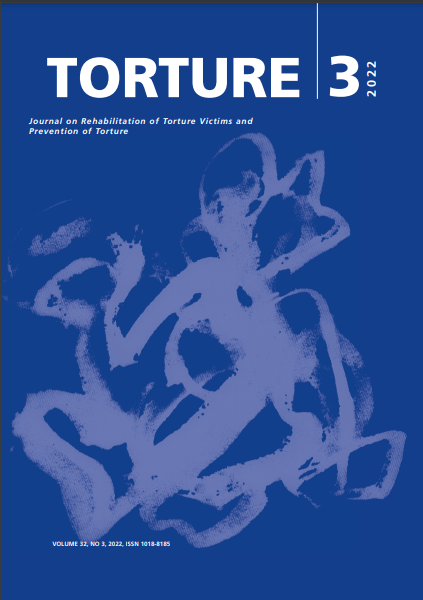Literacy limitations to psychological evaluation tools: The case of MU
DOI:
https://doi.org/10.7146/torture.v32i3.132023Keywords:
Istanbul Protocol, Psychological Exam, Asylum, PHQ-9, Depression Screeing, PTSD Screening, LiteracyAbstract
In this case, a survivor of torture presents
with symptoms clinically consistent with
both major depressive disorder (MDD)
and post-traumatic stress disorder (PTSD).
During her evaluation, a validated psychological
questionnaire for PTSD was administered
verbally through a translator and
accurately identified this diagnosis. However,
a self-administered (read and completed by
the client) questionnaire for MDD vastly underestimated
the severity of her symptoms
and failed to diagnose her with depression.
The client had not completed grade school,
so it is likely that her literacy level impacted
the accuracy of this questionnaire. This highlights
one of the many limitations that exist
when administering psychological surveys.
Through understanding these limitations,
forensic evaluators can develop ways to
identify, mitigate, and overcome limitations
of these useful tools.
References
Arrieta J., Aguerrebere M., Raviola G., Flores H., Elliott P., Espinosa A., Reyes A., Ortiz-Panozo E., Rodriguez-Gutierrez E. G., Mukherjee J., Palazuelos D., & Franke M. F. (2017). Validity and Utility of the Patient Health Questionnaire (PHQ)-2 and PHQ-9 for Screening and Diagnosis of Depression in Rural Chiapas, Mexico: A Cross-Sectional Study. Journal of Clinical Psychology, 73(9): 1076-1090. https://doi.org/10.1002/jclp.22390.
Baradaran Eftekhari, M., Mahmoodi, Z., Dejman, M., Forouzan, A. S., Falahat, K., Shati, M., Jandaghi, J., & Kane, J. (2021). Local perceptions of mental health in Iran, Semnan Province. Brain and behavior, 11(2), e01971. https://doi.org/10.1002/brb3.1971
Bowling, A. (2005). Mode of Questionnaire Administration Can Have Serious Effects of Data Quality. Journal of Public Health, (3) 281-91. https://doi.org/10.1093/pubmed/fdi031.
Galenkamp, H., Stronks, K., Snijder, M.B., & Derks, E.M. (2017). Measurement invariance testing of the PHQ-9 in a multi-ethnic population in Europe: the HELIUS study. BMC Psychiatry 17, 349. https://doi.org/10.1186/s12888-017-1506-9
Hwang, W., Myers, H., Abekim, j. & Ting, J. (2008). A conceptual paradigm for understanding culture's impact on mental health: The cultural influences on Mental Health (CIMH) model. Clinical Psychology Review, 28(2), 211–227. https://doi.org/10.1016/j.cpr.2007.05.001
Kung, S., Alarcon, R. D., Williams, M. D., Poppe, K. A., Jo Moore, M., & Frye, M. A. (2013). Comparing the Beck Depression Inventory-II (BDI-II) and Patient Health Questionnaire (PHQ-9) depression measures in an integrated mood disorders practice. Journal of affective disorders, 145(3), 341–343. https://doi.org/10.1016/j.jad.2012.08.017
Lindheimer N., Karnouk C., Hahn E., Churbali, D., Schilz, L., Rayes, D., Balboui, M., & Boge, K. (2020). Exploring the Representation of Depressive Symptoms and the Influence of Stigma in Arabic-Speaking Refugee Outpatients. Front Psychiatry, 11:579057. https://doi.org/10.3389/fpsyt.2020.579057
Ma, S., Yang, J., Yang, B., Kang, L., Wang, P., Zhang, N., Wang, W., Zong, X., Wang, Y., Bai, H., Guo, Q., Yao, L., Fang, L., & Liu, Z. (2021). The patient health questionnaire-9 vs. the hamilton rating scale for depression in assessing major depressive disorder. Frontiers in Psychiatry, 12. https://doi.org/10.3389/fpsyt.2021.747139
Olson, K, Smyth J.D., Wang, Y, & Pearson J.E. (2011). The Self-Assessed Literacy Index: Reliability and Validity. Social Science Research, 40(5), 1465-1476. https://doi.org/10.1016/j.ssresearch.2011.05.002.
Pinto-Meza, A, Serrano-Blanco, A, Penarrubia, M.T., Blanco, E. & Haro, J.M. (2005). Assessing Depression in Primary Care with the PHQ-9: Can It Be Carried Out over the Telephone? Journal of General Internal Medicine, 20(8), 738-42. https://doi.org/10.1111/j.1525-1497.2005.0144.x.
Reich, H., Rief, W., Brähler, E., & Mewes, R. (2018). Cross-cultural validation of the German and Turkish versions of the PHQ-9: an IRT approach. BMC Psychol 6, 26. https://doi.org/10.1186/s40359-018-0238-z
Soukenik E, Haran H, Kirsch J, Pyakurel S, & Maleku A. (2021). Barriers and Facilitators of Mental Health Service Utilisation among Bhutanese Refugees in the USA: Findings from a Mixed-Methods Study. Br J Soc Work. https://doi.org/10.1093/bjsw/bcab123.
Wulsin L., Somoza E., & Heck J. (2002). The Feasibility of Using the Spanish PHQ-9 to Screen for Depression in Primary Care in Honduras. Primary Care Companion Journal of Clinical Psychology, 4(5): 191-195. https://doi.org/10.4088/pcc.v04n0504.
Zhong, Q., Gelaye, B., Fann, J. R., Sanchez, S. E., & Williams, M. A. (2014). Cross-cultural validity of the Spanish version of PHQ-9 among pregnant Peruvian women: A rasch item response theory analysis. Journal of Affective Disorders, 158, 148–153. https://doi.org/10.1016/j.jad.2014.02.012
Downloads
Published
How to Cite
Issue
Section
License
Copyright (c) 2022 Torture Journal

This work is licensed under a Creative Commons Attribution-NonCommercial-NoDerivatives 4.0 International License.
We accept that some authors (e.g. government employees in some countries) are unable to transfer copyright. The Creative Commons Licence Attribution-NonCommercial-NoDerivatives 4.0 International (CC BY-NC-ND 4.0) covers both the Torture Journal and the IRCT web site. The publisher will not put any limitation on the personal freedom of the author to use material contained in the paper in other works which may be published, provided that acknowledgement is made to the original place of publication.


